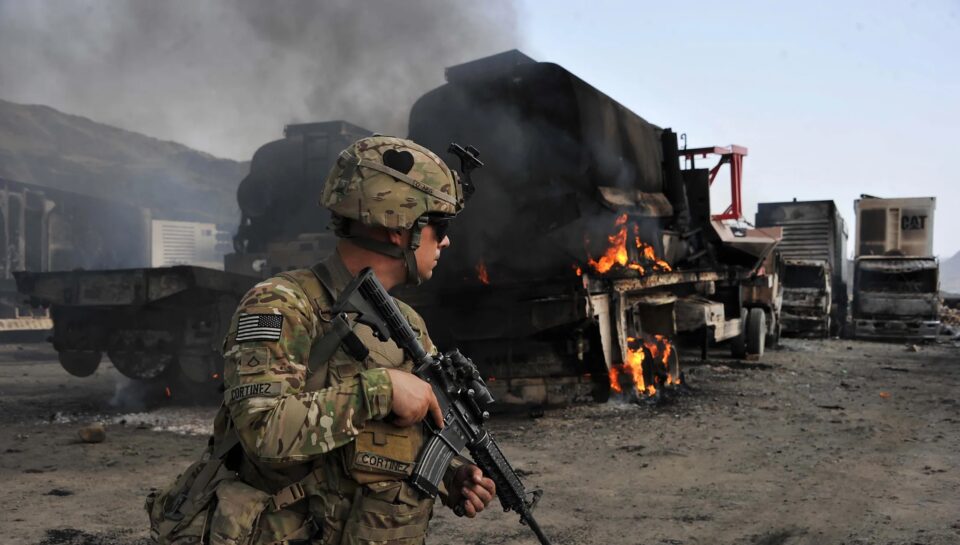The past few days across the region have been very telling. From the protests in Kabul to the appointment of Ayatollah Mike to CIA Station Chief – Iran, the region has plunged into unrest again.
Let’s talk about Afghanistan, where the government has become unstable and the President is rumored to have sought refuge in a US military base.
Last Wednesday’s massive terrorist attack in Kabul’s diplomatic sector happened, Afghanistan went into a panicked state. The panic was more from having their completely failed security apparatus exposed in such a gruesome fashion than responding to the attack itself. From the government to the security apparatus, rather than determine the real reason for the attack, turned all their energy on falsely blaming Pakistan. Their Indian counterparts quickly joined in. As with every terror attack in the region, the answer was into in Aabpara or Rawalpindi, but Nangahar, Afghanistan.
The Afghanistan National Directorate of Security (NDS) spent their initial energies on claiming that Pakistan’s ISI has sponsored the Haqqani Network in carrying out this attack inside Kabul. The most vocal was Amrullah Saleh, who served as head of the National Directorate of Security from 2004 until his resignation in 2010. Prior to that he was a member of Ahmad Shah Massoud’s Northern Alliance, a military front that came to formation in late 1996 after the Islamic Emirate of Afghanistan (Taliban) took over Kabul.
Saleh’s distaste for Pakistan is understandable since he spent the majority of his life on the losing side of the battlefield, along with General Abdul Rashid Dostum, Burhanuddin Rabbani, Ahmad Shah Massoud, Asif Mohseni, Mohammad Mohaqiq, and Abdul Qadir.
After pushing the “Pakistan did it narrative” to a crescendo, they announced that the blast site looked more like a cruise missile has stuck it, not an explosion. While this story was still making its rounds, Ariana News announced that an Afghan MP had been connected with the water tanker used in the explosion, and had used a bulletproof/black-windowed vehicle to move the explosives to Kabul. He hails from Nangarhar province in Afghanistan, firmly in the hold of the Islamic State – Khorasan.
https://twitter.com/SelayGhaffar/status/870297723110658048
But the Haneef Atmar, National Security Advisor to the President, had something to add before the conversation was moved on. Atmar claimed that a call from Mark Sedwill, UK National Security Advisor, had told them that the attack was planned outside Afghanistan, although this story can’t be found anywhere other than the Afghan National Security Advisor’s twitter page.
Another distraction to keep the focus on Pakistan, rather than their own internal problems.
Clarification !!
“Attack had been planned OUTSIDE Afghanistan” https://t.co/qNKWTFs7gd
Mohammed Haneef Atmar محمد حنیف اتمر (@MHaneefAtmar) June 2, 2017
He also claimed to speak with US National Security Advisor, H. R. McMaster, but no such information was provided from there.
Yesterday, Friday, when the protestors took to Presidential Palace to demand answers from their President and government, they were met with more security than the water tanker on Wednesday. Reports in the Afghan media were that President Ghani has ordered all roads towards Presidential Palace closed, but the police and security forces went further to implement the order. Opening fire on their own citizens, 7 protestors were killed. There were also reports that a police officer had murdered 6 of his own and then pledged his allegiance to the Taliban at the Zabul outpost. As the situation in Kabul fell further apart, rumors emerged that President Ghani has been helicoptered from the Presidential Palace to Bagram Airfield.
This all comes on the heels of an al-Jazeera report that Islamic State fighters have huddled in the mountains of Afghanistan training for an attack against the Kremlin in Moscow.
The current state of the government is unknown, but rumors of an Afghan Spring are circulating quickly.
What does this mean for Afghanistan?
Afghanistan has been in a state of collapse since the Islamic State – Khorasan (IS-K) laid their foundations. Prior to that, the Taliban was manageable for the combined US/ISAF forces, but with IS-K in the mix, disgruntled jihadis with no place to go, found a more brutal terrorist group to join. Khorasan is made up of a mixture of Tehrik-e-Taliban Pakistan (TTP), Jamat-ul-Ahrar (JuA), Lashkar-e-Islam (LeI), Lashkar-e-Jhangva (LeJ), Jamaat-ul-Dawah (JuD) & disgruntled former al-Qaeda and Taliban fighters. That makes for a motley crew of terrorists, which also lead to General Nicholson saying, “We can’t leave Afghanistan because after 15 years of war, it has the greatest concentration of terror groups in the world.”
Gen.Nicholson says we can’t leave Afghanistan because after 15yrs of war, it has the “greatest concentration” of terror groups in the world. pic.twitter.com/M5tZFXHJFO- Kelley B. Vlahos (@KelleyBVlahos) February 9, 2017
If Afghanistan’s government has fallen to the power of the people, this could be a very good thing. The people have been excluded from the negotiating process by a government taking dictation from New Delhi and Washington, DC. Rather than take the $800 billion that has spent on Afghanistan since 2001, and build up their own security forces, that money has been absorbed through the ultra-corrupt government of Hamid Karzai and Ashraf Ghani, which honestly is more of an extension of Karzai’s government. There is significant fear that since the warlords of the country have run the government, they will return to power in their localized kingdoms.
Additionally, there seems to be proof that Karzai’s government was providing safe haven to the Tehrik-e-Taliban Pakistan for strategic depth against Pakistan. For those unaware, the TTP has claimed over 80,000 innocent Pakistani lives since 2007 for its acts of terror inside our borders.
With the people in control, Afghanistan may find peace, but there may be significant bloodshed to remove the puppets and proxies that have terrorized the people for decades.
The ball is firmly in the hands of the Afghan people now. They must decide whether they will rule their country or if they will continue to be puppets of global and regional super powers.


